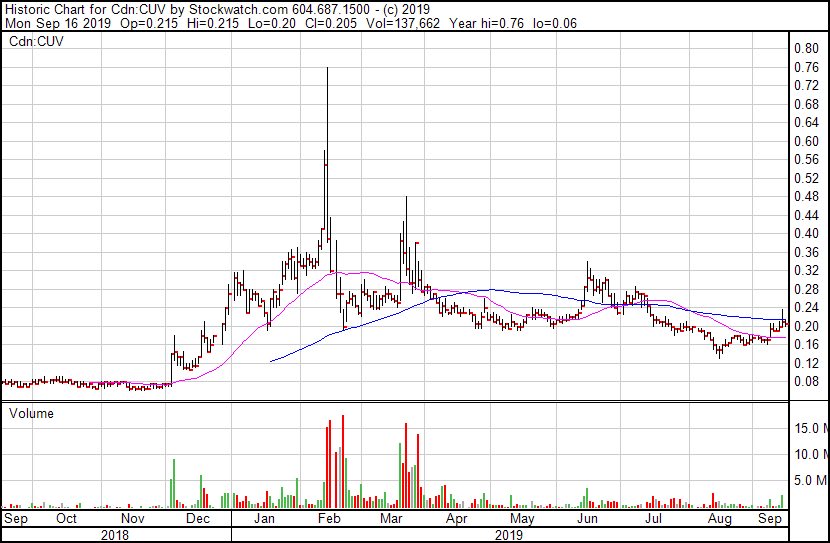CUV Ventures Corp (TSXV: CUV) was the number one volume trader on the TSX-Venture exchange this past Friday. It does that every once in a while. The $30 million market cap company gathers steam in discussion forums at irregular frequencies among opaque references about timing, despite no coherent focus in its narrative.
Venture investors are suckers for upside potential, and CUV has managed to gather enough of it in the same place that they have managed to remain well-discussed and traded for going on two years without ever really executing.

The company’s revenue generating segment is an online travel and bookings service that booked $172,000 in sales in the quarter ending in February for a top line gross of $71,000. CUV’s annual financials, for the period ending in May are due by the end of the month. The travel segment showed recession in both QoQ and same-period sales over the past two quarters, potentially as a result of a shift in corporate focus to CUV’s developing payments and remittance business.
Digital payments have become a growing slice of the global banking infrastructure, and CUV has expressed an intention to compete for a piece of it on multiple channels. They’ve appended the REVOLU- prefix to half a dozen different nouns, branding services for pay-as-you-go mobile phone top-ups, the payment of utility bills, real estate transactions, and a lending division.

CUV’s consumer banking ambitions are underpinned by a €5M line of credit extended by Veslin Investments SL at 9.5% pa, causing us to wonder how competitive the initial consumer lending rate could be when they launch. Veslin Investments was involved in a 2017 proposal to alter the in-development Rvolu-PAY software to be based around blockchain technology, as was the style at the time. CUV elected to build RevoluPAY with regular database infrastructure instead of blockchain ledgers in July of 2018.
CUV hasn’t set a coherent rollout timeline for Revolu-PAY or any of its other derivatives. The company’s updates often center around licenses being applied for and approvals being sought in various different jurisdictions, and various groups of vendors being added to wallet apps or networks. The result is a cultivated feeling that approval of one license or another might make this company a significant part of the global payments network any minute now, and that potential is being kept distinctly front-of-mind.
This Jimmy Pettit chaired company has shown that it can consistently get the street’s attention. The latest volume bump may have had to do with a September 6th early warning report disclosing that CEO Steve Marshall had purchased 4.5 million shares of CUV, bringing his total holdings to 20.9 million shares, just under 14% of the total outstanding share count.
At the end of February, CUV had 18 million warrants outstanding at a $0.075 strike price, and another 4.7 million options outstanding at a $0.123 strike price. The final 8 million shares of the 20 million escrowed shares CUV used to buy the travel business were released in March.
CUV Ventures is currently trading at $0.22 on the TSX Venture Exchange.
Information for this briefing was found via Sedar and CUV Ventures. The author has no securities or affiliations related to this organization. Not a recommendation to buy or sell. Always do additional research and consult a professional before purchasing a security. The author holds no licenses.




